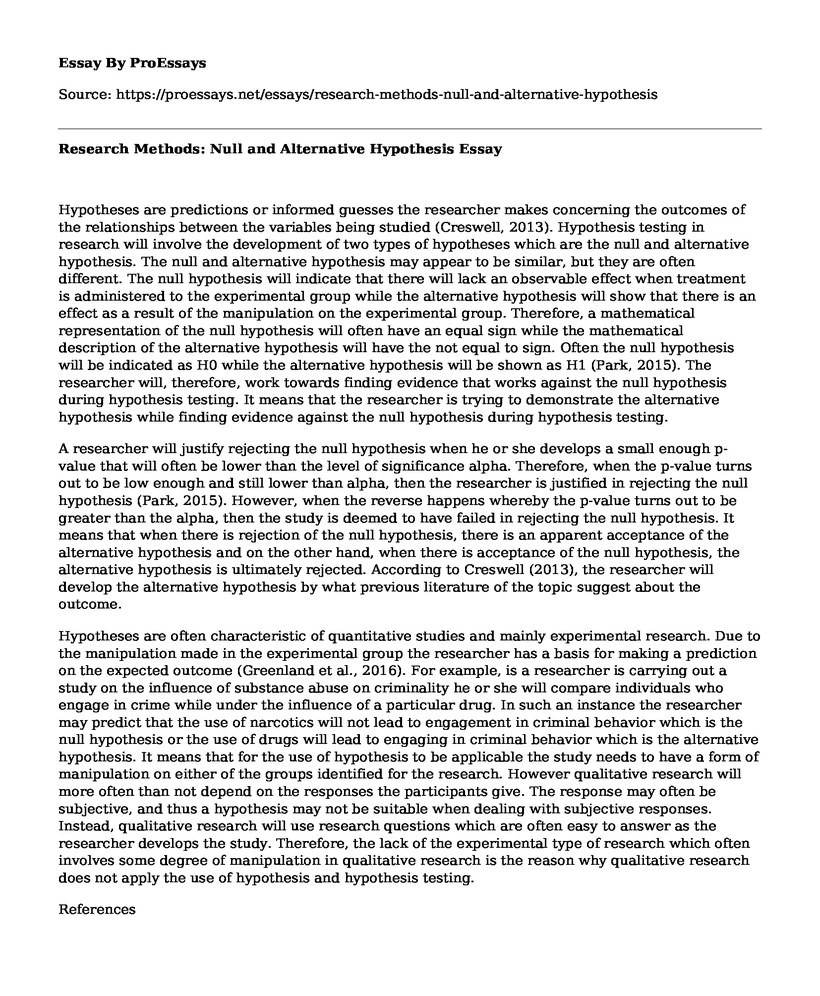Hypotheses are predictions or informed guesses the researcher makes concerning the outcomes of the relationships between the variables being studied (Creswell, 2013). Hypothesis testing in research will involve the development of two types of hypotheses which are the null and alternative hypothesis. The null and alternative hypothesis may appear to be similar, but they are often different. The null hypothesis will indicate that there will lack an observable effect when treatment is administered to the experimental group while the alternative hypothesis will show that there is an effect as a result of the manipulation on the experimental group. Therefore, a mathematical representation of the null hypothesis will often have an equal sign while the mathematical description of the alternative hypothesis will have the not equal to sign. Often the null hypothesis will be indicated as H0 while the alternative hypothesis will be shown as H1 (Park, 2015). The researcher will, therefore, work towards finding evidence that works against the null hypothesis during hypothesis testing. It means that the researcher is trying to demonstrate the alternative hypothesis while finding evidence against the null hypothesis during hypothesis testing.
A researcher will justify rejecting the null hypothesis when he or she develops a small enough p-value that will often be lower than the level of significance alpha. Therefore, when the p-value turns out to be low enough and still lower than alpha, then the researcher is justified in rejecting the null hypothesis (Park, 2015). However, when the reverse happens whereby the p-value turns out to be greater than the alpha, then the study is deemed to have failed in rejecting the null hypothesis. It means that when there is rejection of the null hypothesis, there is an apparent acceptance of the alternative hypothesis and on the other hand, when there is acceptance of the null hypothesis, the alternative hypothesis is ultimately rejected. According to Creswell (2013), the researcher will develop the alternative hypothesis by what previous literature of the topic suggest about the outcome.
Hypotheses are often characteristic of quantitative studies and mainly experimental research. Due to the manipulation made in the experimental group the researcher has a basis for making a prediction on the expected outcome (Greenland et al., 2016). For example, is a researcher is carrying out a study on the influence of substance abuse on criminality he or she will compare individuals who engage in crime while under the influence of a particular drug. In such an instance the researcher may predict that the use of narcotics will not lead to engagement in criminal behavior which is the null hypothesis or the use of drugs will lead to engaging in criminal behavior which is the alternative hypothesis. It means that for the use of hypothesis to be applicable the study needs to have a form of manipulation on either of the groups identified for the research. However qualitative research will more often than not depend on the responses the participants give. The response may often be subjective, and thus a hypothesis may not be suitable when dealing with subjective responses. Instead, qualitative research will use research questions which are often easy to answer as the researcher develops the study. Therefore, the lack of the experimental type of research which often involves some degree of manipulation in qualitative research is the reason why qualitative research does not apply the use of hypothesis and hypothesis testing.
References
Creswell, J. W. (2013). Research design: Qualitative, quantitative, and mixed methods approaches. Sage publications.
Greenland, S., Senn, S. J., Rothman, K. J., Carlin, J. B., Poole, C., Goodman, S. N., & Altman, D. G. (2016). Statistical tests, P. European journal of epidemiology, 31(4), 337-350.
http://link.springer.com/article/10.1007/s10654-016-0149-3
Park, H. M. (2015). Hypothesis testing and statistical power of a test. https://scholarworks.iu.edu/dspace/bitstream/handle/2022/19738/Hypothesis%20Testing%20and%20Statistical%20Power%20of%20a%20Test.pdf%3Bjsessionid%3DF69B39557BD52F8D2A52951B33ACAFF2?sequence%3D1
Cite this page
Research Methods: Null and Alternative Hypothesis. (2021, Apr 26). Retrieved from https://proessays.net/essays/research-methods-null-and-alternative-hypothesis
If you are the original author of this essay and no longer wish to have it published on the ProEssays website, please click below to request its removal:
- Essay Example on Violence in the Media
- Finding Sources on Child Poverty in Uganda Topic Example
- Nicotine Replacement Therapy Research Paper Example
- Compare and Contrast Essay on Sainsbury J Plc and Tesco Plc
- Paper Example on Otis Elevator: Designing, Manufacturing, Serving Aerospace and Building Systems
- Paper Example on Quantitative Study Results: Analysis of HAM-D and HAM-A Tests
- Essay Sample on Exploring the Benefits of Nvivo 11.0 in Content Analysis







